winston spencer churchill

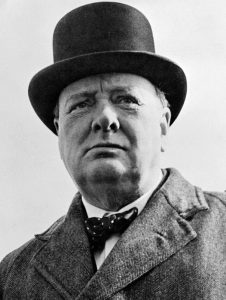 I think we all have one…a second career, or a career that could have been, had we chosen to take a different road in life. Some people actually step back from the career they have, sometimes, to pursue the one that should have been, and others simply know that they could have, if they had chosen to. I was one of those people. I spent much of my working years as an insurance agent, and a good one, I believe, but after spending thirteen years as a caregiver, I also know that I could have been a nurse, had I chosen that road. My daughter, Corrie Petersen chose to make that journey transition, and now she is a nurse, after spending those same thirteen years helping my take care of her grandparents, along with her sister, Amy Royce, children Chris and Josh, niece, Shai Royce, nephew Caalab Royce, and many other family caregivers in our Caregiving Villages, but none of the rest of us made that second career choice.
I think we all have one…a second career, or a career that could have been, had we chosen to take a different road in life. Some people actually step back from the career they have, sometimes, to pursue the one that should have been, and others simply know that they could have, if they had chosen to. I was one of those people. I spent much of my working years as an insurance agent, and a good one, I believe, but after spending thirteen years as a caregiver, I also know that I could have been a nurse, had I chosen that road. My daughter, Corrie Petersen chose to make that journey transition, and now she is a nurse, after spending those same thirteen years helping my take care of her grandparents, along with her sister, Amy Royce, children Chris and Josh, niece, Shai Royce, nephew Caalab Royce, and many other family caregivers in our Caregiving Villages, but none of the rest of us made that second career choice.
Sir Winston Leonard Spencer-Churchill was a British statesman, soldier, and writer who served as Prime Minister of the United Kingdom twice, from 1940 to 1945 during the Second World War, and again from 1951 to 
 1955. Apart from two years between 1922 and 1924, he was a Member of Parliament from 1900 to 1964 and represented a total of five constituencies. He was also a well-known war strategist, and a part of the reason that World War II ended the way that it did. One would think that he knew exactly what his one and only career was, and that he fulfilled his destiny, but he also had another career living inside of him, and some say that he missed his calling. Sir Winston Leonard Spencer-Churchill was a very talented artist. He actually painted 500 paintings, 50 of which were displayed professionally. In fact, it was Picasso, himself, who said that Sir Winston Leonard Spencer-Churchill missed his true calling, and very much could have chosen art as his career. My daughter, Amy Royce could have too, I think, as could my son-in-law, Kevin Petersen, and a number of others in my family. I have almost zero talent when it comes to art, but I am very impressed with those in my family
1955. Apart from two years between 1922 and 1924, he was a Member of Parliament from 1900 to 1964 and represented a total of five constituencies. He was also a well-known war strategist, and a part of the reason that World War II ended the way that it did. One would think that he knew exactly what his one and only career was, and that he fulfilled his destiny, but he also had another career living inside of him, and some say that he missed his calling. Sir Winston Leonard Spencer-Churchill was a very talented artist. He actually painted 500 paintings, 50 of which were displayed professionally. In fact, it was Picasso, himself, who said that Sir Winston Leonard Spencer-Churchill missed his true calling, and very much could have chosen art as his career. My daughter, Amy Royce could have too, I think, as could my son-in-law, Kevin Petersen, and a number of others in my family. I have almost zero talent when it comes to art, but I am very impressed with those in my family 
 who do.
who do.
I suppose that a second career that is never a road taken, would end up being called a “hobby” sometimes, although, I would not consider caregiving a “hobby” in any way, but art could fall into that category…as could writing, which I guess could have been a third career for me. Strangely, I don’t really consider myself to be an author, because I have never published a book. Is internet blogging of stories, publishing? Maybe. And maybe we all have many talents that could easily have turned into careers, had we decided to go down that road, or another road. Maybe, “That Second Career” isn’t really even the right title, nevertheless, it is the title.
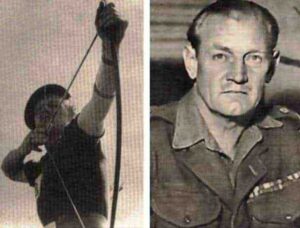
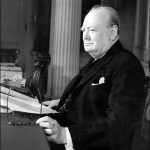 Most soldiers know that when you are trying to sneak up on your enemy, it’s probably best to leave the bagpipe playing at home. Nevertheless, John “Mad Jack” Churchill, who was one of the most colorful and unusual soldiers to fight in World War II, might find just about anything…you just never knew. The British-born “Mad Jack” Churchill had no known relation to Prime Minister Winston Spencer-Churchill, although I would not be surprised to find there was a relation. He was known for carrying a Scottish Claymore Sword into battle, and felt that any officer who didn’t have one while going into battle, was basically out of uniform. “Mad Jack”was also an avid archer and bagpipe player and brought both of these hobbies onto the battlefield.
Most soldiers know that when you are trying to sneak up on your enemy, it’s probably best to leave the bagpipe playing at home. Nevertheless, John “Mad Jack” Churchill, who was one of the most colorful and unusual soldiers to fight in World War II, might find just about anything…you just never knew. The British-born “Mad Jack” Churchill had no known relation to Prime Minister Winston Spencer-Churchill, although I would not be surprised to find there was a relation. He was known for carrying a Scottish Claymore Sword into battle, and felt that any officer who didn’t have one while going into battle, was basically out of uniform. “Mad Jack”was also an avid archer and bagpipe player and brought both of these hobbies onto the battlefield.
Churchill volunteered for Great Britain’s first-ever commando unit in 1941, and he participated in covert operations in Italy and Norway. In one Norway operation, he played his bagpipes on the landing craft as they approached the shore, then picked up his sword and attacked. In 1944, “Mad Jack” was on assignment in Yugoslavia to assist with the communist partisans under Josip “Tito” Broz, and that was when his infamous bagpipe incident happened.
During a mission to attack a German position on the Island of Brac, “Mad Jack” and his men advanced under heavy fire. In the end, he was the only one left alive. After running out of bullets, and in typical “Mad Jack” style, he picked up his bagpipe and played “Will Ye No Come Back Again?,l.” It was an 18th-century song celebrating the Jacobite Prince Charles III’s escape from being captured by the British monarchy.
Unimpressed, the Germans knocked him out with an explosion and captured him, but they spared his life…not because of his bagpipe prowess, however, but because they thought he was related to Prime Minister Winston Spencer-Churchill. They thought that having a relative of the prime minister would provide them with sone leverage. Unfortunately for them, as far as anyone knew there was no connection. “Mad Jack” was placed in a prison camp, from which he escaped captivity twice before making it home.
Churchill married Rosamund Margaret Denny, the daughter of Sir Maurice Edward Denny and granddaughter of Sir 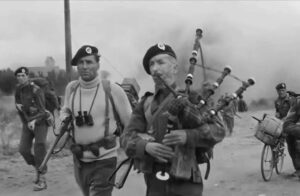
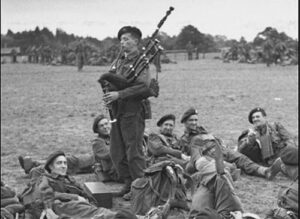 Archibald Denny, on March 8, 1941. They had two children, Malcolm John Leslie Churchill, born 1942, and Rodney Alistair Gladstone Churchill, born 1947. He also had a grandson named James Also stair Gladstone Churchill. “Mad Jack” lived a long and happy life. Nevertheless, I seriously doubt if any part of it was as crazy as the time he spent in World War I. He passed away on March 8, 1996 at 89 years old, in the county of Surrey.
Archibald Denny, on March 8, 1941. They had two children, Malcolm John Leslie Churchill, born 1942, and Rodney Alistair Gladstone Churchill, born 1947. He also had a grandson named James Also stair Gladstone Churchill. “Mad Jack” lived a long and happy life. Nevertheless, I seriously doubt if any part of it was as crazy as the time he spent in World War I. He passed away on March 8, 1996 at 89 years old, in the county of Surrey.
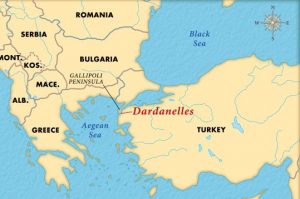
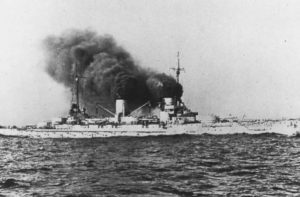 The Dardanelles is a narrow strait running between the Black Sea in the east and the Mediterranean Sea in the west. In World War I it was a much contested area right from the start. It was the subject of a naval attack, spearheaded by Winston Churchill, who was at that time Britain’s young first lord of the Admiralty. On March 18, 1915, six English and four French battleships headed toward the strait. When they reached the area, Turkish mines blasted five of the ships, sinking three of them and forcing the Allied navy to draw back until land troops could be coordinated to begin an invasion of the Gallipoli peninsula. With troops from the Ottoman Empire and Germany mounting a spirited defense of the peninsula, however, the Gallipoli offensive turned into a significant setback for the Allies, with 205,000 casualties among British Empire troops and nearly 50,000 among the French.
The Dardanelles is a narrow strait running between the Black Sea in the east and the Mediterranean Sea in the west. In World War I it was a much contested area right from the start. It was the subject of a naval attack, spearheaded by Winston Churchill, who was at that time Britain’s young first lord of the Admiralty. On March 18, 1915, six English and four French battleships headed toward the strait. When they reached the area, Turkish mines blasted five of the ships, sinking three of them and forcing the Allied navy to draw back until land troops could be coordinated to begin an invasion of the Gallipoli peninsula. With troops from the Ottoman Empire and Germany mounting a spirited defense of the peninsula, however, the Gallipoli offensive turned into a significant setback for the Allies, with 205,000 casualties among British Empire troops and nearly 50,000 among the French.
When the Allies got involved, the latter offensives in Mesopotamia and Palestine saw more success. By September 1917, the crucial cities of Jerusalem and Baghdad were both in British hands. As the war stretched into the following year, these defeats and an Arab revolt had combined to destroy the Ottoman economy and devastate its land. Some 6 million people were dead and millions more starving. In early October 1918, unable to bank on a German victory any longer, the Turkish government in Constantinople decided to cut its losses and approached the Allies about brokering a peace deal. On October 30, 1918, British and Turkish representatives signed the Treaty of Mudros, which ended Ottoman participation in World War I. According to the terms of the treaty, Turkey had to demobilize its army, release all prisoners of war, and evacuate its Arab provinces, the majority of which were already under Allied control…and open the Dardanelles and Bosporus to Allied warships.
This last condition was fulfilled on November 12, 1918, the day after the armistice, when a squadron of British warships steamed through the Dardanelles, past the ruins of the ancient city of Troy, toward 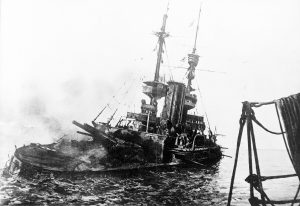
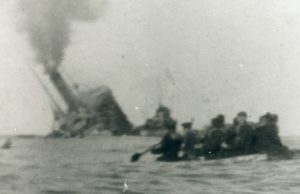 Constantinople. By the post-war terms worked out by the Allies in the Treaty of Sevres in 1920, the waterways that were formerly under Ottoman rule…including the Dardanelles, the Sea of Marmora and the Bosporus…were now placed under international control, with the designation that their “navigation…shall in future be open, both in peace and war, to every vessel of commerce or of war and to military and commercial aircraft, without distinction of flag.”
Constantinople. By the post-war terms worked out by the Allies in the Treaty of Sevres in 1920, the waterways that were formerly under Ottoman rule…including the Dardanelles, the Sea of Marmora and the Bosporus…were now placed under international control, with the designation that their “navigation…shall in future be open, both in peace and war, to every vessel of commerce or of war and to military and commercial aircraft, without distinction of flag.”
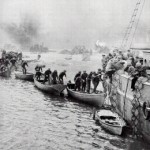 Not many disastrous wartime defeats could be declared a miraculous success, but in May of 1940, with the Germans advancing quickly toward Dunkirk the French, British, and Canadian troops were trapped between the German forces, and the English Channel. This situation was far more that a disastrous defeat, it was about to get catastrophic, because there appeared to be no way to get the Allied troops out of the way of the German forces, and the Allies were looking at the loss of thousands of soldiers, if something wasn’t done…and done quickly!!
Not many disastrous wartime defeats could be declared a miraculous success, but in May of 1940, with the Germans advancing quickly toward Dunkirk the French, British, and Canadian troops were trapped between the German forces, and the English Channel. This situation was far more that a disastrous defeat, it was about to get catastrophic, because there appeared to be no way to get the Allied troops out of the way of the German forces, and the Allies were looking at the loss of thousands of soldiers, if something wasn’t done…and done quickly!!
It was at this point that my 15th cousin 0nce removed, Winston Spencer-Churchill showed the world what a great master strategist he really was. He had warned the Allies that “the whole root, the core, and brain of the British Army” was stranded and likely to die in Dunkirk, if they didn’t come up with a way to evacuate them. A plan was devised, and given the code name, Operation Dynamo. This plan was really a God-given way of escape, where their seemed to be no way. In fact, Churchill 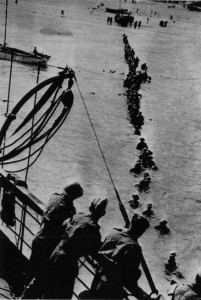 called it “a miracle of deliverance.” And so it was.
called it “a miracle of deliverance.” And so it was.
The plan used every available “ship”…right down to the smallest lifeboat. These vessels…thousands of them, many of which were manned by civilian volunteers, and each of them knew the danger they were putting themselves and their vessels in, but they bravely made the decision to participate anyway. On this day, May 26, 1940, at 19:00 hours, Vice Admiral Ramsey was given the orders and Operation Dynamo commenced. The order was given to proceed, amid information that Boulogne and Calais had been captured. This meant that the only port available was Dunkirk. Ramsey estimated that only 45,000 troops could be rescued. Lord John Galt had ordered the troops to retreat to the sea. As the Belgian army was defeated, King Leopold asked the Germans for an armistice. This dragged out the negotiations, and bought the Allies 24 hours to get their troops out.
The rescue was slow and, in fact took days. The weather prevented the Luftwaffe from attacking for a time, but that didn’t last long. Within a matter of days the weather cleatred and the Germans set out to try to stop the 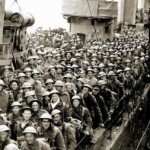 rescue that they had not realized was of the magnitude it was. From their attack, several ships wer sunk, but that still didn’t stop the seccess of the operation. By the time the last boat left Dunkirk harbor, about 338,226 soldiers (198,229 British and 139,997 French) were evacuated by a fleet of 860 boats.
rescue that they had not realized was of the magnitude it was. From their attack, several ships wer sunk, but that still didn’t stop the seccess of the operation. By the time the last boat left Dunkirk harbor, about 338,226 soldiers (198,229 British and 139,997 French) were evacuated by a fleet of 860 boats.
The evacuation was dubbed Operation Dynamo, because during World War One, Dover Castle was powered with electricity by a dynamo located beneath the castle. The castle was used as naval headquarters during World War Two, and the dynamo room is where British Vice-Admiral Bertram Ramsay planned the Dunkirk rescue mission. It is also the place where Ramsay briefed Churchill while rescue efforts were underway.
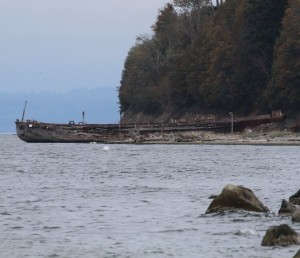 After Bob and I had the opportunity to view the old minesweeper, now located off Picnic Park near Edmonds, Washington, I have been curious about mines and minesweepers, in general. That said, I did a little research on them, and was surprised at what I found. Landmines have been in existence since the early Ming Dynasty in the 1400s. It seems such a strange thing to me to set explosives in areas where they could not only trigger an explosion when an enemy crosses paths with them, but they could also trigger explosions when their own citizens crossed paths with them. I suppose those accidental friendly hits would be considered collateral damage, and were acceptable losses in the grand scheme of things, but it still seems like a horrible way to guard an area. Still, it was definitely an effective way to guard and area, border, or waterway.
After Bob and I had the opportunity to view the old minesweeper, now located off Picnic Park near Edmonds, Washington, I have been curious about mines and minesweepers, in general. That said, I did a little research on them, and was surprised at what I found. Landmines have been in existence since the early Ming Dynasty in the 1400s. It seems such a strange thing to me to set explosives in areas where they could not only trigger an explosion when an enemy crosses paths with them, but they could also trigger explosions when their own citizens crossed paths with them. I suppose those accidental friendly hits would be considered collateral damage, and were acceptable losses in the grand scheme of things, but it still seems like a horrible way to guard an area. Still, it was definitely an effective way to guard and area, border, or waterway.
Nevertheless, I can understand why countries such as England, who is surrounded by water, and therefore vulnerable to certain types of attacks, especially during the earlier wars, like World War I and World War II, might have decided as they did in World War II, to lay mine traps to guard against movement by the German U-Boats in World War II. The U-Boats were feared by all their enemies, and considered one of the biggest dangers in the war by Winston Spencer Churchill. They made it almost impossible to have any prior knowledge of their presence, until it was too late to get away from them. Still, putting mines in the English Channel, where your own ships had to maneuver too, almost seems like taking a risk that would be greater than the benefit that it provided. Nevertheless, submarine traps were laid in the English Channel, and they served a purpose.
When considering a minesweeper in World War II, when ships were made of metal, I was curious as to why there would be a wooden hulled minesweeper in World War II. It has come to my attention that the minesweeper in Edmonds, may not have seen action at all. There seems to be a bit of confusion as to when it was built, and when it came to it’s final resting place in the Edmonds area. If it was indeed built for World War II, and never saw action, then my thought was why was it a wooden hull. I found the answer to that in my research on mines. There are several types of mines, as I mentioned earlier. Landmines were the earliest, but when it came to floating mines, they were mostly magnetic. Now when you put a metal minesweeper, or any other metal ship or submarine, near a magnetic mine…well, I’m sure you can get a picture of the seriousness of the problem they would have. A wooden hulled minesweeper on the other hand would have to actually come into contact with the mine to have that problem. Perhaps this was the reason for mines laid under the surface of the water and held in place by a cable. They were more invisible to the eye, and so created the ability to trigger the explosion when an unsuspecting ship or submarine found themselves in the wrong place. These mines blew a hole in the hull, rendering the ship or submarine helpless, as it took on water and quickly sunk.
There have been stories in the news over the years, of mines showing up on the shore years after they were 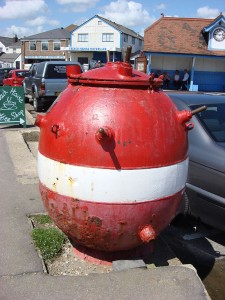 laid. It was a big problem, as were the landmines that were left after the wars. No clear record were kept apparently, and so removal of the mines was never made a priority. I remember when Princess Diana made it one of her priorities to find a way to get those landmines removed. The injuries to so many people who wandered into a minefield just tore at her heart. In hearing about the stories of tragedies resulting from those minefields, my mind cringed at the thought of those injuries. I found myself thinking that her quest to remove them was such an important one. Because I love to hike, I can see how easy it could be to create a trail that would cross paths with a minefield that has been around for decades. Sometimes, the necessary weapons of our warfare bring such destruction, that you find yourself wondering why people and nations can’t just get along, but we all know that is not to be. As long as there has been life on Earth, there have been wars of one kind or another, and I don’t expect that to change now, so these weapons will continue to exist and to be a big problem.
laid. It was a big problem, as were the landmines that were left after the wars. No clear record were kept apparently, and so removal of the mines was never made a priority. I remember when Princess Diana made it one of her priorities to find a way to get those landmines removed. The injuries to so many people who wandered into a minefield just tore at her heart. In hearing about the stories of tragedies resulting from those minefields, my mind cringed at the thought of those injuries. I found myself thinking that her quest to remove them was such an important one. Because I love to hike, I can see how easy it could be to create a trail that would cross paths with a minefield that has been around for decades. Sometimes, the necessary weapons of our warfare bring such destruction, that you find yourself wondering why people and nations can’t just get along, but we all know that is not to be. As long as there has been life on Earth, there have been wars of one kind or another, and I don’t expect that to change now, so these weapons will continue to exist and to be a big problem.
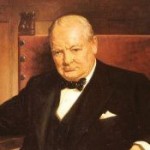 Over the thousands of years since man has been on the Earth, amazing people, as well as evil people, have made memorable speeches. Some speeches were never expected to be memorable or historic, and others were expected to be so, because they were designed to be uplifting, inspirational, morale building, or a tribute filled with gratitude. It was the latter that inspired Sir Winston Spencer Churchill to make his speech on August 20, 1940. Europe was entrenched in World War II and things weren’t going as well as they had hoped. They had taken a few rather large beatings from the Germans, and morale was not as high as they had hoped. The speech was given as the United Kingdom prepared for the expected German invasion. After a series of defeats for the Allies over the prior months, Churchill was trying to tell the people that they were in a much better position now. He was correct, of course. Shortly after the speech, the British won the battle, the first significant defeat for the previously unstoppable Wehrmacht.
Over the thousands of years since man has been on the Earth, amazing people, as well as evil people, have made memorable speeches. Some speeches were never expected to be memorable or historic, and others were expected to be so, because they were designed to be uplifting, inspirational, morale building, or a tribute filled with gratitude. It was the latter that inspired Sir Winston Spencer Churchill to make his speech on August 20, 1940. Europe was entrenched in World War II and things weren’t going as well as they had hoped. They had taken a few rather large beatings from the Germans, and morale was not as high as they had hoped. The speech was given as the United Kingdom prepared for the expected German invasion. After a series of defeats for the Allies over the prior months, Churchill was trying to tell the people that they were in a much better position now. He was correct, of course. Shortly after the speech, the British won the battle, the first significant defeat for the previously unstoppable Wehrmacht.
Times of war are often when great men make speeches to inspire the military troops to persevere. They can be a battle cry of sorts. Or they can be a reflection of such deep gratitude that it leaves us awestruck. Churchill was first moved to utter those famous words upon his exit from the Battle of Britain Bunker at RAF Uxbridge on August 16, 1940. He had been the Number 11 Group RAF Operations Room during a day of battle. Afterwards, Churchill told Major General Hastings Ismay, “Don’t speak to me, I have never been so moved.” His emotions were so deep, that he had to think about this for a time. The two were silent for a few moments, and then Churchill said, “Never in the field of human conflict has so much been owed by so many to so few.” That declaration became the basis of his speech to the House of Commons on August 20, 1940.
In his speech, Winston Churchill said, “The gratitude of every home in our Island, in our Empire, and indeed throughout the world, except in the abodes of the guilty, goes out to the British airmen who, undaunted by odds, unwearied in their constant challenge and mortal danger, are turning the tide of the World War by their prowess and by their devotion. Never in the field of human conflict was so much owed by so many to so few. All hearts go out to the fighter pilots, whose brilliant actions we see with our own eyes day after day, but we must never forget that all the time, night after night, month after month, our bomber squadrons travel far into Germany, find their targets in the darkness by the highest navigational skill, aim their attacks, often under the heaviest fire, often with serious loss, with deliberate, careful discrimination, and inflict shattering 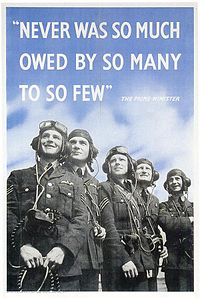 blows upon the whole of the technical and war-making structure of the Nazi power. On no part of the Royal Air Force does the weight of the war fall more heavily than on the daylight bombers who will play an invaluable part in the case of invasion and whose unflinching zeal it has been necessary in the meanwhile on numerous occasions to restrain…”
blows upon the whole of the technical and war-making structure of the Nazi power. On no part of the Royal Air Force does the weight of the war fall more heavily than on the daylight bombers who will play an invaluable part in the case of invasion and whose unflinching zeal it has been necessary in the meanwhile on numerous occasions to restrain…”
Words can be so powerful. They have the power to change the course of history when they are used to inspire soldiers in battle to a victory that seemed impossible just moments before the words were spoken. Sometimes, all it takes to bring about a victory is to listen to the one person who sees that victory, no matter how many defeats have preceded it, is still possible. Great men…men who have inspired victory…have been around a long time. These men, and women too, refuse to accept defeat. And they have the ability to speak powerfully to convince others that victory can follow defeat.
 On this day, January 24, 1965, my 15th cousin once removed, Winston Leonard Spencer Churchill passed away. As an eight year old girl, his passing had little impact on my life…then. I wasn’t even aware that he was my cousin, that he had passed away, or of the impact his life had on the people of the world. I especially had no knowledge that as his cousin, I might have been in line for part of his estate, but I was in line for part of it, nevertheless.
On this day, January 24, 1965, my 15th cousin once removed, Winston Leonard Spencer Churchill passed away. As an eight year old girl, his passing had little impact on my life…then. I wasn’t even aware that he was my cousin, that he had passed away, or of the impact his life had on the people of the world. I especially had no knowledge that as his cousin, I might have been in line for part of his estate, but I was in line for part of it, nevertheless.
Of course, in the end, that portion of his estate went to England. From what I am able to gather, Winston Churchill expressed a desire to divide his estate among all of his living relatives…all of them, and believe me, there were a lot of them. The catch was that all of them had to be found or the money went to the state. With family members all over the world, that was a very tall order, and one that would prove fruitless…or at least too big for the task to be completed.
They found our family and the rest of my dad’s side of the family, but somewhere along the way, the search for Winston Churchill’s many family members dwindled to a dead end, and the portion of the estate that was to go to us, was lost to us forever. It’s strange that even then, I knew nothing of the man, the money, or the world-wide search that had taken place. Many have said that perhaps they didn’t search as hard as they should have, and others have said that the search was handled be a disinterested agency. Whatever the case may be, the search failed to find everyone it needed to locate, and that was the end of the story.
I seriously doubt if the money, no matter how substantial, carried a huge impact of the wealth of England or the English Crown. I don’t know how much would have gone to each of the many relatives who were living at that time. It may have been such an insignificant amount that it would have gone almost unnoticed…or maybe it would have been enough change the life of every one of them forever. We will never know, because we don’t know the amount, for sure, or how many would have benefitted from it.
In later years, after I learned of the strangeness of Winston Spencer Churchill’s will, and of his relationship to me, and my part in his will, I wondered why he would have written such a will. He must have known how hard it would be to carry out his last request. He must have assumed that the share each person would receive would be small, at best. So, why would he write such a will? I’m sure he had his reasons, and I am just as sure that we will never know them, but I have never stopped wondering. I’m sure people would think that I wonder about it, because I’m sorry I didn’t get a share of the money, but in reality, it is my opinion that money is a tool to get the things you need, and to bless those around you. All too often, when handed a large amount of  money with no understanding that happiness does not come as a side effect of having it, money ends up ruining the life of the person who received it. So does that mean that I’m against wealth…certainly not. I just think that money has a place, and it makes a great tool, but a terrible master.
money with no understanding that happiness does not come as a side effect of having it, money ends up ruining the life of the person who received it. So does that mean that I’m against wealth…certainly not. I just think that money has a place, and it makes a great tool, but a terrible master.
I have great respect for Winston Spencer Churchill. His abilities, especially in winning wars are well known. I don’t believe he was crazy when he wrote out his will either, but was maybe a man who felt that he could do some measure of good for those who were his family, and by requiring that all be found, he eliminated the ability to leave his inheritance to a chosen few…just in case they were tempted not to look further.
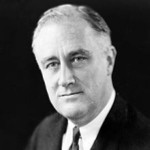
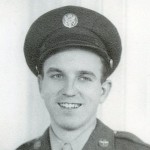 In the height of World War II, on January 14, 1943, President Franklin D Roosevelt made history when he became the first president to travel by airplane on official business. The trip was not without danger. The German U-boats were wreaking havoc on Allied war ships in the Atlantic, and it was decided that a face to face conference was needed to discuss strategy. The man President Roosevelt was going to see, was my fifteenth cousin once removed, Winston Spencer-Churchill. No American President had flown on official business before, but with security in the Atlantic uncertain, Roosevelt’s advisors reluctantly agreed that he should fly. I’m sure his frail health at 60 years of age played a part in their decision too. The secret trip began on January 11, and the plane had to make several stops along the way. They took off from Florida with a first stop in the Caribbean to refuel and allow the president to rest. They then took off and headed south along the South American coast to Brazil, then across the Atlantic to Gambia, finally reaching Casablanca on this day, January 14, 1943.
In the height of World War II, on January 14, 1943, President Franklin D Roosevelt made history when he became the first president to travel by airplane on official business. The trip was not without danger. The German U-boats were wreaking havoc on Allied war ships in the Atlantic, and it was decided that a face to face conference was needed to discuss strategy. The man President Roosevelt was going to see, was my fifteenth cousin once removed, Winston Spencer-Churchill. No American President had flown on official business before, but with security in the Atlantic uncertain, Roosevelt’s advisors reluctantly agreed that he should fly. I’m sure his frail health at 60 years of age played a part in their decision too. The secret trip began on January 11, and the plane had to make several stops along the way. They took off from Florida with a first stop in the Caribbean to refuel and allow the president to rest. They then took off and headed south along the South American coast to Brazil, then across the Atlantic to Gambia, finally reaching Casablanca on this day, January 14, 1943.
It seems strange to us now that they would take such a roundabout route, but things were different then. The Boeing 314 Flying Boat that had been dubbed the Dixie Clipper was a big heavy plane. It had a flight range of 3,500 miles, and the direct route would have been about 4326 miles, making at lease one stop necessary. Since the Secret Service considered air travel for a president as risky anyway, I’m sure they wanted to take a 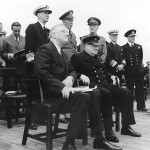 route that would keep them as far away from any fighting as they could. Also, the final leg of the trip required that the group transfer to an Army transport plane. The C-54 was required to fly at 15,000 feet to cross the Atlas Mountains…an altitude that seems insignificant today, but must have been quite high then. The Secret Service personnel and FDR’s advisors were worried about the oxygen levels affecting the president, and in the end, he did have to go on oxygen for a time during that part of the flight.
route that would keep them as far away from any fighting as they could. Also, the final leg of the trip required that the group transfer to an Army transport plane. The C-54 was required to fly at 15,000 feet to cross the Atlas Mountains…an altitude that seems insignificant today, but must have been quite high then. The Secret Service personnel and FDR’s advisors were worried about the oxygen levels affecting the president, and in the end, he did have to go on oxygen for a time during that part of the flight.
The flight was mastered successfully, and the two men were safely tucked into the Anfa Hotel where Roosevelt and Churchill were both in suites that were close together, making it the perfect place for the conference to take place…after the rooms were cleared of listening devises that had been planted by unknown persons, that is. The advisors and chiefs of staff did most of the hard work of the negotiations, but the presence of Roosevelt and Churchill kept them on task and working toward an agreement. The conference was very important to both sides, as the British were being hit very hard, and Roosevelt needed to keep the American troops advancing and winning their battles, so he could demonstrate to the American people that the tide of this war was turning. People get weary of war quite quickly, and in order to keep their support, victory in battle is key.
The Casablanca Conference was looked at by some as a victory for the British negotiators, because Churchill’s strategy prevailed, but they had missed the fact that the Americans also gained British commitments to long-term goals that went beyond the immediate objectives in the Mediterranean. The Americans agreed to attack Sicily after the victory in North Africa and the British agreed to allow a massive buildup of Allied Forces in 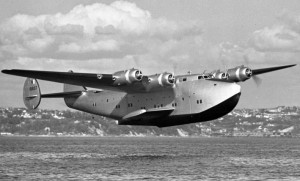 Britain, which would allow for an invasion of France with a target date of May 1, 1944. The invasion actually took place on June 6, 1944, and would become a day we all know as D-Day, when the troops stormed the beaches of Normandy…and that is where my dad came in. Since he was one of the Allied Forces that was stationed in England, his B-17G Bomber was one of those that provided cover for that invasion. It seems quite strange to me that a conference that took place over a year before, and 2 months prior to my dad’s enlistment, would ultimately place him in a position to fight in one of the most well known battles of World War II.
Britain, which would allow for an invasion of France with a target date of May 1, 1944. The invasion actually took place on June 6, 1944, and would become a day we all know as D-Day, when the troops stormed the beaches of Normandy…and that is where my dad came in. Since he was one of the Allied Forces that was stationed in England, his B-17G Bomber was one of those that provided cover for that invasion. It seems quite strange to me that a conference that took place over a year before, and 2 months prior to my dad’s enlistment, would ultimately place him in a position to fight in one of the most well known battles of World War II.

